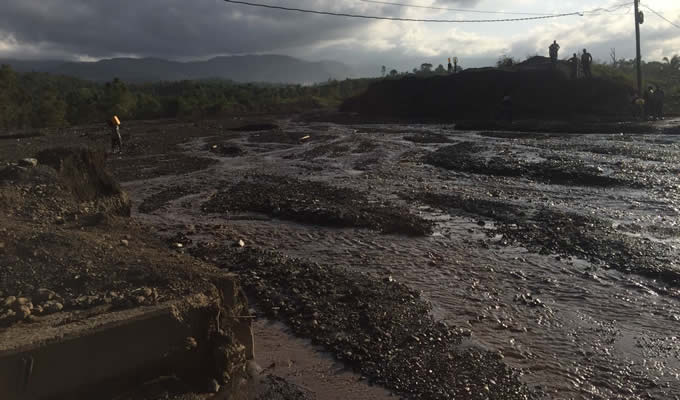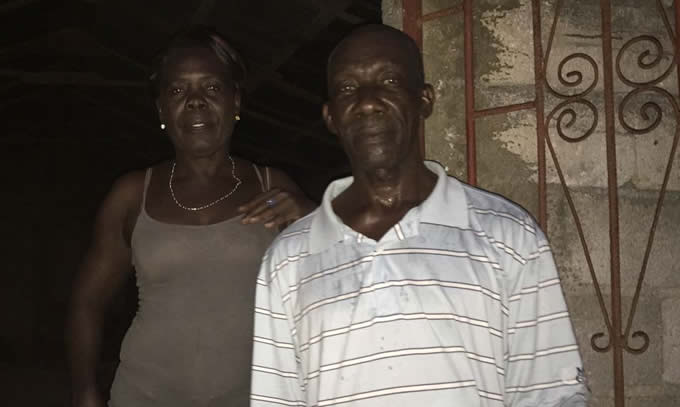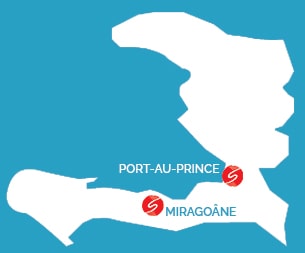A week after the passing of hurricane Matthew, thousands of people are in need. SOLIDARITÉS INTERNATIONAL’s teams have begun activities in the region of Les Nippes and will go on to help effectively as many people as possible.
It is 5.30 pm near Miragoane, in the region of Les Nippes, in Southern Haiti. The heat is stifling, mosquitoes that are vectors of various diseases, such as malaria, zyka, dengue fever, are ferocious and attack in large numbers every piece of naked flesh.
15 minutes away from Miragoane city centre is the Dufour area. Way out, in a very wet zone and even more since the hurricane, hundreds of people try to recover from the horror they lived. “I have lost everything, confides Jacqueline, who has lost her house. What can I do now? My two children and I have nothing to drink, nothing to eat. Some persons help us to buy some water in a shop, but it is not decontaminated, and I am afraid of being sicker that I already am.”

In Petit Goave, the bridge has been destroyed by the passing of the hurricane. © Tugdual de Dieuleveult / SOLIDARITÉS INTERNATIONAL
Some areas hard to reach
SOLIDARITÉS INTERNATIONAL’s teams have been wandering this region for the last week. They were present the very next day of the disaster to make the first assessments and bring an adapted and efficient response. “In the first days, Emergency Team Coordinator Anne Gaelle Lebeau explains –who arrived in the first hours after the disaster – it has been so hard to reach some areas. All roads were cut off. It was impossible for us to join the remotest locations. Little by little, axes are being cleared of waste, debris, mudslides, and we were able to meet affected people”.
Consequently, SOLIDARITÉS INTERNATIONAL’s team had to count the number of victims, listen to their needs and define the best action. “Distributing food, providing drinkable water, giving tools to rebuild shelters… All of these things have to be made quickly but properly. Sometimes, it is hard to wait before providing help, but it is essential to not forget someone”, confides Head of Mission Thibault Mayaud.
Fortunately, stock was relatively well-supplied
Today, equipment is here. Water taps and bladders have arrived and are ready to be used after being passed through the expert hands of water, sanitation and hygiene emergency team manager Pierre Desvillette,. “When I arrived in Port-au-Prince, I managed the stock and I prepared the equipment. I had to take an inventory of the material and filters that were usable right away. Fortunately, the stock was relatively well supplied and many water tanks, distribution ramps and water taps were available.”

© Tugdual de Dieuleveult / SOLIDARITÉS INTERNATIONAL
“I have nothing left, I’m injured and I’m old”
Water taps are expected by the population, such as Baptiste and Justine. Like Jacqueline, they have also lost their house in the storm. At 60 years old, injured by a piece of metal sheeting which came off a shelter during the storm, Baptiste seems afflicted and doesn’t see too well the next days, months or years. “If I had money, I would rebuild a new house. But I have nothing left, I’m injured, and I’m old. What am I going to do now?”
In this chaos, SOLIDARITÉS INTERNATIONAL’s teams are deploying a bit further every day to bring help to affected people in areas where no one else goes.
In the coming hours, equipment from Port-au-Prince will arrive. The first litres of drinkable water could relieve population’s thirst. They should prevent impoverished people from drinking unsafe water and being sick. Here, the main fear is cholera. Present since 2010 in the country, the fight against this plague was only just starting to be effective. Today, without fast and efficient aid, the disease could rise again, and further affect this country going through hard times.
Support the people affected by hurricane Matthew
Haiti
Context and action- 11.84 million inhabitants
- 163rd out of 191 countries on the Human Development Index
- 110.215 people helped

